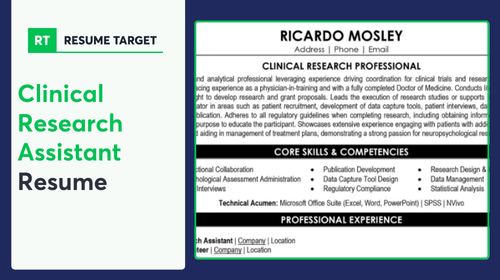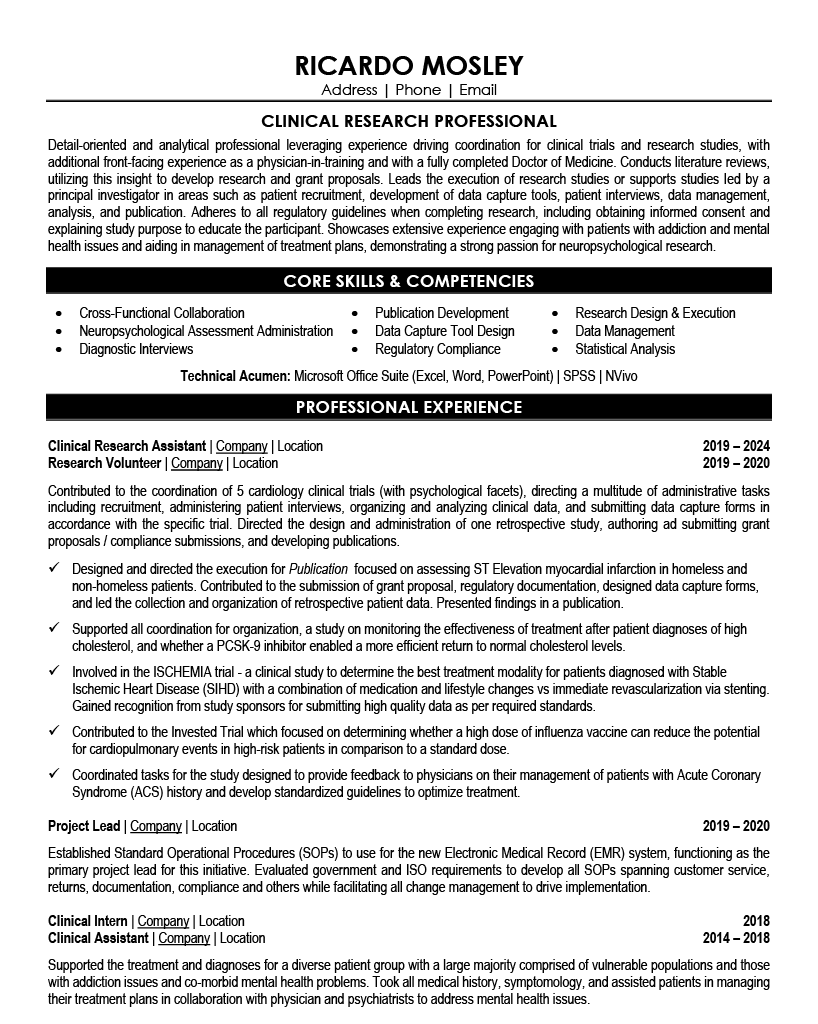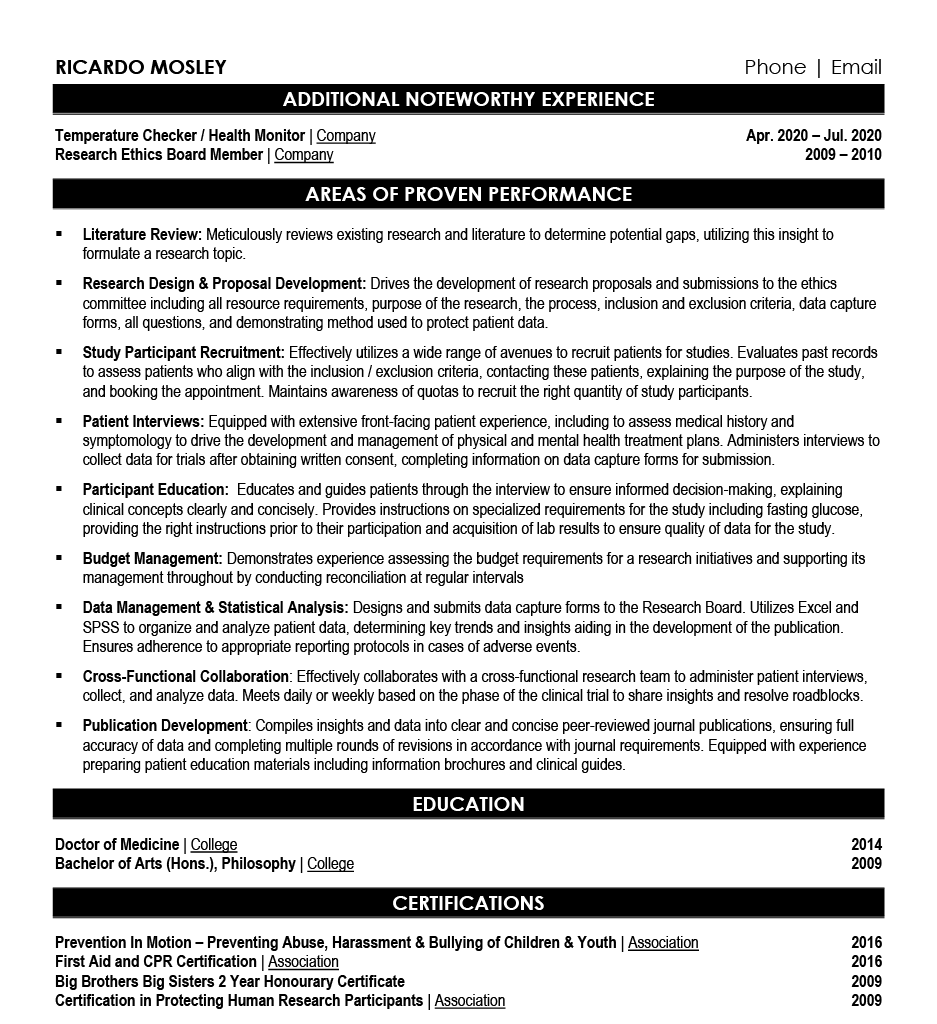

Translating complex research work into a compelling resume can feel like writing an abstract in a foreign language. Getting noticed in the competitive clinical research field takes more than listing your lab skills.
Are you struggling to showcase both your technical abilities and soft skills on paper? Your resume needs to demonstrate your research expertise while highlighting your project management and communication abilities that make studies successful.
Resume Target specializes in helping Clinical Research Assistants transform their experience into powerful career stories. We know how to present your contributions to research protocols, data management, and study coordination in ways that catch hiring managers' attention.


At the frontlines of medical breakthroughs, Clinical Research Assistants serve as the vital bridge between scientific discovery and patient care, managing critical tasks like participant recruitment and research protocol implementation that keep clinical trials running smoothly.
Your role as a Clinical Research Assistant involves wearing multiple hats - from conducting detailed participant interviews and maintaining meticulous study records to ensuring strict compliance with research protocols and safeguarding patient confidentiality throughout the research process.
Whether you're just starting out or looking to advance your career, the clinical research field offers exciting opportunities to grow from an assistant role into positions like Clinical Research Coordinator or Clinical Research Manager, where you can take on greater responsibility in shaping the future of medical treatments.
Let's talk about the exciting earning potential in the Clinical Research Assistant field! Your career path as a Clinical Research Assistant offers compelling compensation that grows substantially with experience and specialization. Here's what's exciting: your earning potential can nearly triple as you advance from entry-level positions to senior roles.
Figures from: PCC Climb
Starting as a Clinical Research Assistant opens doors to an exciting career in medical research. Your path can lead from handling basic trial protocols to managing entire research programs and teams.
To advance in clinical research, you'll need to master both technical expertise and leadership capabilities that go well beyond basic trial management.
- Clinical Trial Protocol Development and Implementation - GCP (Good Clinical Practice) Certification - Data Management and Analysis - Strategic Communication and Team LeadershipBreaking into clinical research often starts with entry-level positions like Clinical Research Coordinator (CRC) or Data Entry Specialist roles at research sites or Contract Research Organizations (CROs).
To advance in clinical research, you'll need to develop key competencies including Clinical Trial Knowledge and GCP Expertise, which form the foundation of your career growth.
Note: I've kept the introduction focused on actionable entry points based on the Reddit discussion, while the transition sentence incorporates verified skill requirements from the Parexel source, maintaining a direct and professional tone throughout.Requirements from CRA Resources
From biotech hubs to pharmaceutical powerhouses, Clinical Research Assistant roles are thriving in key medical research centers.
Figures from Zippia
Struggling to showcase your clinical research experience, protocol management skills, and patient interaction abilities in a way that catches a hiring manager's eye? This comprehensive, section-by-section guide will walk you through creating a Clinical Research Assistant resume that highlights your most relevant achievements and capabilities.
If you're like most Clinical Research Assistants, condensing your detailed protocol management and data collection expertise into a few powerful sentences can feel as challenging as coordinating a complex multi-site trial.
While you excel at maintaining precise documentation and ensuring regulatory compliance, translating these specialized skills into a compelling summary that catches a hiring manager's attention requires a different kind of precision - one that showcases both your technical capabilities and your impact on research outcomes.
How would you characterize your overall approach to managing clinical trials and what distinguishes you from other Clinical Research Assistants in terms of your research methodology and patient interaction style?
Reason: This helps you articulate your unique value proposition and professional identity in clinical research, setting the tone for your entire resume. It encourages you to think about your distinctive qualities that make you effective in trial management and patient care.
What combination of technical skills, regulatory knowledge, and soft skills best defines your capability as a Clinical Research Assistant across different study phases and therapeutic areas?
Reason: This question helps you create a well-rounded summary that balances your technical expertise with interpersonal abilities, which are both crucial in clinical research. It ensures you don't overlook any critical competency areas that define your professional profile.
How would you describe your overall contribution to maintaining research integrity and study compliance throughout your career as a Clinical Research Assistant?
Reason: This prompts you to highlight your commitment to research quality and regulatory compliance, which are fundamental aspects of the role. It helps frame your experience in terms of value added to research organizations and study outcomes.
As a Clinical Research Assistant, you need to demonstrate both your technical research capabilities and your ability to handle day-to-day clinical operations effectively.
Your skills section should showcase your proficiency in research protocols and regulatory compliance, while also highlighting practical abilities like patient screening, data collection, and electronic medical records (EMR) management.
Showcase your research expertise by organizing your experience into three powerful sections: a concise role overview highlighting your clinical setting, measurable achievements that spotlight your contribution to successful trials, and core responsibilities that demonstrate your mastery of research protocols and patient care.
Many Clinical Research Assistants struggle to effectively demonstrate their contribution to complex, team-based research projects and clinical trials. Transform your experience into compelling metrics by connecting your protocol management, patient coordination, and data collection efforts to successful study completion rates, regulatory compliance scores, and enrollment targets.
The responsibilities section demonstrates how Clinical Research Assistants contribute to successful clinical trials and research outcomes. Your role supports critical medical research while ensuring compliance with protocols, making it essential to communicate these technical duties in clear terms that highlight their impact on healthcare advancement.
Your educational background and certifications demonstrate your commitment to clinical research standards and protocols. Prioritize your most relevant credentials first, especially those related to Good Clinical Practice (GCP), human subjects protection, and any specialized research certifications that align with your target role.
Now that you've created a strong foundation using Resume Target's comprehensive resume writing guidelines, you're ready to transform your resume into a powerful tool for landing clinical research positions.
While many candidates focus solely on customizing their cover letters, tailoring your Clinical Research Assistant resume for each position is equally crucial for showcasing your specific research experience, protocol knowledge, and data management skills.
A customized resume not only helps you navigate through ATS systems by incorporating relevant keywords, but it also demonstrates to hiring managers that your clinical research capabilities align perfectly with their study requirements and organizational needs.
Ready to stand out in the competitive clinical research field? Let's transform your resume into a targeted document that proves you're the ideal candidate they've been searching for!
Don't let a lack of professional experience hold you back from launching your Clinical Research Assistant career!
Your academic background, laboratory skills, and research projects can create a compelling story that shows employers you're ready to contribute to clinical studies.
Focus on highlighting your understanding of research protocols, data collection experience, and any relevant coursework or internships.
For more guidance on structuring your resume, check out the Student Resume Writing Guide to ensure you're presenting your qualifications effectively.
Your summary section is your chance to showcase your academic excellence, research experience, and laboratory skills that make you an ideal candidate for clinical research positions.
Focus on highlighting relevant coursework, research projects, and any volunteer or internship experience that demonstrates your understanding of clinical protocols and data collection.
"Detail-oriented and methodical Clinical Research Assistant with foundational experience through university research projects and healthcare volunteer work. Proficient in data collection, patient screening, and maintaining research documentation according to IRB protocols. Demonstrated ability to assist principal investigators with participant recruitment and study coordination during undergraduate research. Seeking to leverage strong analytical skills and passion for clinical research to contribute to meaningful medical studies while ensuring compliance with regulatory requirements."
Now's your chance to showcase the academic foundation that prepared you for clinical research excellence - from biostatistics courses to research methodology training!
Don't just list your degree - highlight relevant coursework like "Clinical Trial Design"or "Research Ethics,"and feature impactful projects where you analyzed medical data or assisted with study protocols.
Insufficient data available despite thorough search.Relevant Coursework: Clinical Research Methods | Biostatistics | Research Ethics | Data Management | Clinical Trial Design | Medical Terminology
Key Projects:
Clinical Trial Database Development: Designed and implemented a comprehensive database system for tracking patient enrollment and outcomes in a simulated Phase II clinical trial.
Patient Recruitment Strategy Analysis: Collaborated with a research team to evaluate and optimize recruitment strategies for a mock multi-center clinical study.
Transform your academic knowledge, lab experience, and research fundamentals into compelling skills that showcase your readiness to support vital clinical studies and contribute to groundbreaking medical research.
As an aspiring Clinical Research Assistant, your foundation in these essential skills positions you perfectly for growth in the expanding field of clinical research, where your contribution can make a meaningful impact on healthcare advancement.
Let's face it - translating your complex clinical trial experience and technical protocols into clear, compelling achievements can feel overwhelming, especially when you're trying to stand out in the competitive pharma landscape.
At Resume Target, we specialize in crafting resumes for clinical research professionals that highlight both your technical expertise and soft skills that matter in patient-facing roles.
Our proven track record includes helping countless Clinical Research Assistants showcase their precise attention to detail while emphasizing their crucial role in successful trial outcomes.
With major pharma companies ramping up their clinical trials this quarter, now is the perfect time to transform your resume from clinical to compelling - let's connect for a free consultation today.
Impress any hiring manager with our Pharma resume writing service. We work with all career levels and types of Pharma professionals.
Learn More → Pharma Resume Writing Services